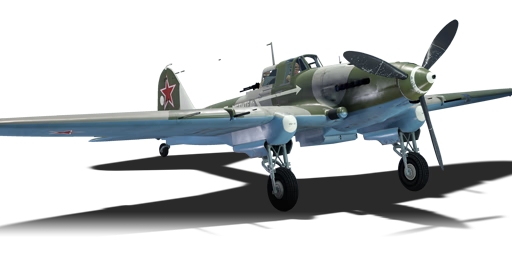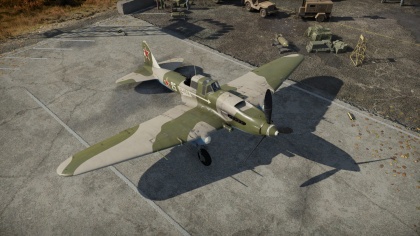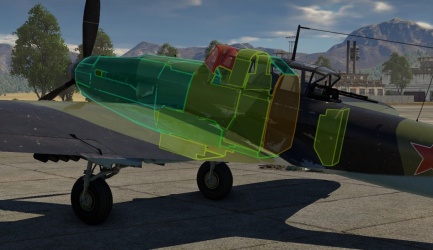Difference between revisions of "IL-2M "Avenger""
(Added premium navtable) |
|||
| Line 316: | Line 316: | ||
{{AirManufacturer Ilyushin}} | {{AirManufacturer Ilyushin}} | ||
{{USSR attackers}} | {{USSR attackers}} | ||
| + | {{USSR premium aircraft}} | ||
Revision as of 11:42, 18 April 2020
Contents
| This page is about the Soviet attacker IL-2M "Avenger". For other uses, see IL-2 (Family). |
Description
The IL-2M "Avenger" is a premium rank Soviet attacker
with a battle rating of (AB), (RB), and (SB). It was introduced in Update 1.41.27. The IL-2M "Avenger" is a premium variant of the IL-2M type 3.
This plane is, as with all IL aircraft, a ground attacker. It should avoid confronting any fighter aircraft, as it has terrible manoeuvrability and even worse energy retention. In an emergency, the hitting power of the 23's is more than enough to obliterate enemy fighters, but the dog-fighting should be left to the fighters.
The IL-2M "Avenger" is a rather distinctive vehicle, as it is the only premium IL-2 in the Soviet tree. A very well armored aircraft, though somewhat unmaneuverable, the Avenger is an excellent variant of the IL series aircraft. This particular version has a rear gunner equipped with a 12.7 mm Berezin UB machine gun, capable of dealing with any enemies attacking from the rear, and the forward firepower is nothing to be trifled with.
General info
Flight Performance
Though the IL-2M models are improved with the better AM-38F engine, the IL-2M "Avenger" is still sluggish due to the overall plane weight. Speed, maxed out around the 400 km/h range, mean many fighters are able to catch up and outpace the IL-2M and take it down on their terms. Acceleration is decent up until a speed of around 330 km/h before slowing down. Though WEP is available on the plane, it doesn't seem to help assist in acceleration very well.
The roll rate of the aircraft is particularly slow, which is exacerbated with wing-mounted weapons like rockets. Elevator and rudder response are up to par however and can be relied on for more responsive manoeuvres.
| Characteristics | |||||||
|---|---|---|---|---|---|---|---|
| Stock | |||||||
| Max Speed (km/h at 1,400 m) |
Max altitude (meters) |
Turn time (seconds) |
Rate of climb (meters/second) |
Take-off run (meters) | |||
| AB | RB | AB | RB | AB | RB | ||
| 387 | 371 | 49.2 | 50.3 | 6.1 | 6.0 | 800 | |
| Upgraded | |||||||
| Max Speed (km/h at 1,400 m) |
Max altitude (meters) | Turn time (seconds) | Rate of climb (meters/second) |
Take-off run (meters) | |||
| AB | RB | AB | RB | AB | RB | ||
| 430 | 409 | 46.9 | 47.9 | 11.4 | 8.6 | 800 | |
Details
| Features | ||||
|---|---|---|---|---|
| Combat flap | Take-off flap | Landing flap | Air brakes | Arrestor gear |
| ✓ | ✓ | ✓ | X | X |
| Limits | ||||
|---|---|---|---|---|
| Wing-break speed (km/h) |
Gear limit (km/h) |
Combat flap (km/h) |
Max Static G | |
| + | - | |||
| 620 | 320 | 470 | ~9 | ~9 |
| Optimal velocities | |||
|---|---|---|---|
| Ailerons (km/h) |
Rudder (km/h) |
Elevators (km/h) |
Radiator (km/h) |
| < 320 | < 320 | < 320 | > 220 |
| Compressor (RB/SB) | ||
|---|---|---|
| Setting 1 | ||
| Optimal altitude | 100% Engine power | WEP Engine power |
| 750 m | 1,500 hp | 1,620 hp |
Survivability and armour
- 6 mm Steel - Propeller ring
- 4 mm Steel - Armor plates surrounding engine compartment
- 6 mm Steel - Encasing oil cooler
- 5 mm Steel - Cockpit floor
- 6 mm Steel - Cockpit wall/canopy lining
- 12 mm Steel - Pilot/Gunner separating partition
- 4 mm Steel - Upper canopy behind pilot
- 6 mm Steel - Armor plate protecting rear gunner
- 64 mm Bulletproof Glass - Forward canopy
As can be seen by the list of armour types on the IL-2M "Avenger", the plane, like the other IL-series of attacker aircraft, has a capsule of armour surrounding the pilot and most of the plane's modules. While the thickness is not substantial, ranging between 4-5 mm of steel armour, they provide the engine, fuel tanks, and radiators a level of protection not typically enjoyed by other aircraft. The armour collectively also provides substantial protection to the pilot from the front, especially with a 64 mm thick bulletproof glass on the top and the collection of steel armour and modules below.
The pilot's rear armour is also quite substantial with more 6 mm armour platings. However, the crew partition armour of 12 mm combined with the gunner's rear 6 mm of armour means that while the gunner may be knocked out more easily by an enemy at a six o' clock, the pilot can enjoy some more levels of protection for sustained flying.
With the belly of the plane also considerably armoured, the only way to be able to attack the IL-2M "Avenger"'s crew unimpeded is by attacking from above, where there are gaps in the armour for a direct hit onto the pilot.
Though the modules and crew are considerably protected, the control surfaces on the plane are not. As such, the most likely way the IL-2M "Avenger" can be downed is by a shot-off/busted wing, tail, or their respective control systems.
Armaments
Offensive armament
The IL-2M "Avenger" is armed with:
- 2 x 23 mm VYa-23 cannon (150 rpg = 300 total)
- 2 x 7.62 mm ShKAS machine gun (750 rpg = 1,500 total)
Suspended armament
The IL-2M "Avenger" can be outfitted with the following options:
- 4 x 100 kg FAB-100 bombs (400 kg total)
- 4 x 82 mm RS-82 rockets
- 4 x 82 mm RBS-82 rockets
- 4 x 82 mm RS-82 rockets + 4 x 50 kg FAB-50 (forged) bombs (200 kg total)
- 4 x 82 mm RBS-82 rockets + 4 x 50 kg FAB-50 (forged) bombs (200 kg total)
- 4 x 82 mm RS-82 rockets + 4 x 100 kg FAB-100 (forged) bombs (400 kg total)
- 4 x 82 mm RBS-82 rockets + 4 x 100 kg FAB-100 (forged) bombs (400 kg total)
- 2 x 250 kg FAB-250M43 bombs (500 kg total)
- 4 x 132 mm RS-132 rocket
- 4 x 132 mm RS-132 rocket, 4 x 50 kg FAB-50 (forged) bombs (200 kg total)
- 4 x 132 mm RBS-132 rocket, 4 x 50 kg FAB-50 (forged) bombs (200 kg total)
- 4 x 132 mm RS-132 rocket, 4 x 100 kg FAB-100 (forged) bombs (400 kg total)
- 4 x 132 mm RBS-132 rocket, 4 x 100 kg FAB-100 (forged) bombs (400 kg total)
Defensive armament
The IL-2M "Avenger" is defended by:
- 1 x 12.7 mm Berezin UB machine gun, dorsal turret (150 rpg)
Operated by a single gunner, the Berezin UB can provide decent coverage of the IL-2M "Avenger"'s rear. If an enemy loiters around the IL-2's upper six o' clock, the gunner can have a decent chance of reaching out and hitting, or even downing the enemy plane.
Usage in battles
Tactically, as with all IL aircraft, the Avenger is best suited to ground-pounding at low altitude. Avoiding conflict with aircraft is a priority, as, though tanky, the plane will not withstand much-concentrated fire, especially to its wings. When engaging ground targets, approach at a slight climb before nosing down to begin a shallow dive towards them. Bombing in this way will nearly always allow you to get away from the blast wave, and the 1.5-second delay is more than enough for you to gain enough distance, even from the 250 kg bombs. If using both bombs and rockets, lightening the aircraft from the bombs will allow you to more effectively manoeuvre to use rockets before returning to base. Use bombs against tanks and pillboxes, rockets against groups of light armoured vehicles (and occasionally enemy aircraft), and use your machine guns and cannons for AAA, Artillery, Armored cars, and enemy aircraft.
Specific enemies worth noting
All enemy fighters have a chance at critically wounding you, and even enemy attackers will, for the most part, out-perform you.
Counter-tactics
Use the gunner to the best of your ability, but maintaining significant distance from enemy air forces is the best thing to do.
Manual Engine Control
| MEC elements | ||||||
|---|---|---|---|---|---|---|
| Mixer | Pitch | Radiator | Supercharger | Turbocharger | ||
| Oil | Water | Type | ||||
| Controllable | Not controllable | Not controllable | Not controllable | Separate | Not controllable | Not controllable |
Modules
| Tier | Flight performance | Survivability | Weaponry | |||
|---|---|---|---|---|---|---|
| I | Fuselage Repair | Radiator | Turret 12 mm | Offensive 7 mm | ||
| II | Compressor | Airframe | New 12 mm MGs (turret) | New 7 mm MGs | MDZ-42 | |
| III | Wings Repair | Engine | Offensive 23 mm | RO-82 | ||
| IV | 95 Octane Fuel | Engine Injection | Cover | New 23 mm Cannons | RO-132 | |
Pros and cons
Pros:
- Extraordinarily long WEP time at low altitudes
- Extremely durable
- Rear Gunner
- Stable platform for rocket and strafing runs
- Faster than the regular IL-2M and IL-37
- Wide variety of payloads
- Decent ammo count, even for the cannons
- Can fly without wingtips
Cons:
- Slower than the early IL-2s
- Rear gunner cannot engage targets beneath the plane
- Unmaneuverable with bombs
History
Describe the history of the creation and combat usage of the aircraft in more detail than in the introduction. If the historical reference turns out to be too long, take it to a separate article, taking a link to the article about the vehicle and adding a block "/ History" (example: https://wiki.warthunder.com/(Vehicle-name)/History) and add a link to it here using the main template. Be sure to reference text and sources by using <ref>, as well as adding them at the end of the article. This section may also include the vehicle's dev blog entry (if applicable) and the in-game encyclopedia description (under === In-game description ===, also if applicable).
In-game description
On 21st July 1941, the lead designer of the IL-2 Sergey Ilyushin sent a request to the People's Minister of Aviation, calling for the improvement of the IL-2 by upgrading the engine to a 1,675-HP M-82 and increasing the aircraft's armour. The request was extremely urgent, considering that the rapidly advancing German troops at the time threatened serial production of the engines then used on the IL-2. Several influential Party members also called for upgrading the IL-2's engine. Another crucial change, in conjunction with the engine, called for converting the aircraft into a two-seater, based on combat experience. The second crewman would mainly deal with protecting the rear section of the Sturmovik from aerial attack, making it, in the designer's opinion, "nearly invincible". An aft fuel tank, previously installed behind the pilot in the armoured tub, was replaced with a gunner compartment under a stretched canopy, armed with a 12.7 mm (.50-cal) UBT machine gun with 280 rounds of ammunition. The gunner position, just like the pilot's, was well armoured.
Once the prototype was tested, all test pilots concluded that flight performance of the new variant was worse than that of the earlier IL-2 AM-38 variant; however, no changes in overall behaviour were noted, the armour was very effective, and no shortcomings that made flying dangerously were uncovered. Therefore, the new prototype was accepted for serial production.
Based on the two-seat Il-2, armed with Nudelman-Suranov NS-37 in conformable gun pods under the wings, instead of the 20/23 mm cannons, this version is an attempt to create an anti-tank aircraft, first used in combat during the Battle of Kursk. However, the combat effectiveness was quite low and production of the variant was limited to about 3,500. Moreover, the bomb load was decreased from 600 kg to 200 kg. It was replaced by the conventional Il-2 attackers armed with cassettes with cumulative bomblets.
Media
Excellent additions to the article would be video guides, screenshots from the game, and photos.
See also
Links to the articles on the War Thunder Wiki that you think will be useful for the reader, for example:
- reference to the series of the aircraft;
- links to approximate analogues of other nations and research trees.
External links
Paste links to sources and external resources, such as:
- topic on the official game forum;
- encyclopedia page on the aircraft;
- other literature.
| Ilyushin Design Bureau (Илью́шинa Опытное конструкторское бюро) | |
|---|---|
| Bombers | DB-3B · IL-4 |
| Jet Bombers | IL-28* · IL-28Sh |
| Strike Aircraft | IL-8 (1944) |
| Il-2 | IL-2 (1941) · IL-2 (1942) · IL-2M type 3 · IL-2M "Avenger" · IL-2M (1943) · IL-2-37 · IL-2 M-82 |
| Il-10 | IL-10 · IL-10 (1946) |
| Export/Captured | |
| Bombers | ␗DB-3A · ◊IL-28 · ◔IL-28 |
| Strike Aircraft | ▀IL-2 (1942) · ␗IL-10 (1946) · ◔IL-10 |
| * The Chinese Harbin Aircraft Manufacturing Corporation built unlicensed copies of the Il-28 known as the H-5. | |
| USSR strike aircraft | |
|---|---|
| IL-2 | IL-2 (1941) · IL-2 (1942) · IL-2M (1943) · IL-2M type 3 · IL-2M "Avenger" · IL-2-37 · IL-2 M-82 |
| IL-8 | IL-8 (1944) |
| IL-10 | IL-10 · IL-10 (1946) |
| Pe-3 | Pe-3 (e) · Pe-3 · Pe-3bis |
| Su-2 | BB-1 · Su-2 MV-5 · Su-2 TSS-1 · Su-2 (M-82) |
| Su-6 | Su-6 · Su-6 (AM-42) · Su-6 (M-71F) |
| Su-8 | Su-8 |
| Tandem MAI | Tandem MAI |
| TIS MA | TIS MA |
| Tu-1 | Tu-1 |
| Yak-2 | Yak-2 KABB |
| USSR premium aircraft | |
|---|---|
| Fighters | Krasnolutsky's I-15bis · I-16 type 28 · Zhukovsky's I-153-M62 · I-153P · I-180S · I-301 · ITP (M-1) |
| LaGG-3-4 · LaGG-3-23 · LaGG-3-34 · Dolgushin's La-7 · La-11 | |
| Eremin's Yak-3(e) · Yak-3 (VK-107) · Yak-3T · Golovachev's Yak-9M | |
| ▂P-39K-1 · ▂Pokryshkin's P-39N-0 · ▂P-39Q-15 · ▂P-40E-1 · ▂P-47D-27 · ▂P-63A-5 · ▂P-63A-10 · ▂P-63C-5 | |
| ▂Hurricane Mk IIB · ▂Spitfire Mk IXc · ▂Fw 190 D-9 | |
| Twin-engine fighters | I-29 |
| Jet fighters | Su-11 · MiG-15bis ISh · MiG-17AS · MiG-21S (R-13-300) · MiG-23ML |
| Strike aircraft | IL-2M "Avenger" · IL-2 M-82 · IL-8 (1944) · Su-6 · Tandem MAI · TIS MA · Su-8 · Tu-1 |
| Yak-38 · Su-7BMK · Su-25K · Su-39 | |
| Bombers | Po-2M · Be-6 · MBR-2-M-34 · Pe-2-205 · TB-3M-17-32 |
| ▂PBY-5A Catalina · ▂Hampden TB Mk I · ▂A-20G-30 · ▂B-25J-30 | |






